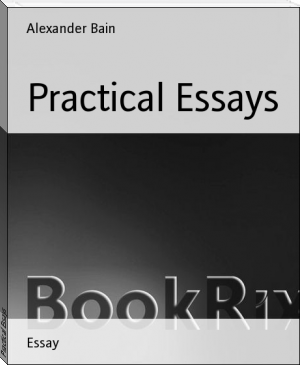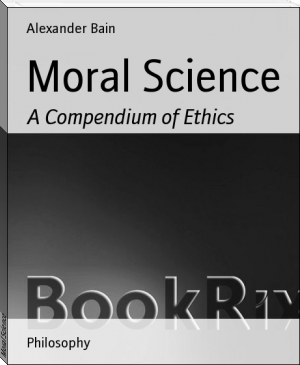author - "Alexander Bain"

al or tutelary, others Dissocial or Self-regarding. Dispositions.The consequences of a mischievous act. Punishment. Private Ethics(Prudence) and Legislation distinguished; their respective spheres.
MACKINTOSH. Universality of Moral Distinctions. Antithesis or Reasonand Passion. It is not virtuous acts but virtuous dispositions that outweigh the pains of self-sacrifice. The moral sentiments havefor their objects Dispositions. Utility. Development of Consciencethrough Association; the constituents are Gratitude, Sympathy,Resentment and Shame, together with Education. Religion mustpresuppose Morality. Objections to Utility criticised. Duties toourselves, an improper expression. Reference of moral sentiments tothe Will.
JAMES MILL. Primary constituents of the Moral Faculty--pleasurable andpainful sensations. The Causes of these sensations. The Ideas of them,and of their causes. Hope, Fear; Love, Joy; Hatred, Aversion. Remotecauses of pleasures and pains--Wealth, Power, Dignity,

al or tutelary, others Dissocial or Self-regarding. Dispositions.The consequences of a mischievous act. Punishment. Private Ethics(Prudence) and Legislation distinguished; their respective spheres.
MACKINTOSH. Universality of Moral Distinctions. Antithesis or Reasonand Passion. It is not virtuous acts but virtuous dispositions that outweigh the pains of self-sacrifice. The moral sentiments havefor their objects Dispositions. Utility. Development of Consciencethrough Association; the constituents are Gratitude, Sympathy,Resentment and Shame, together with Education. Religion mustpresuppose Morality. Objections to Utility criticised. Duties toourselves, an improper expression. Reference of moral sentiments tothe Will.
JAMES MILL. Primary constituents of the Moral Faculty--pleasurable andpainful sensations. The Causes of these sensations. The Ideas of them,and of their causes. Hope, Fear; Love, Joy; Hatred, Aversion. Remotecauses of pleasures and pains--Wealth, Power, Dignity,

